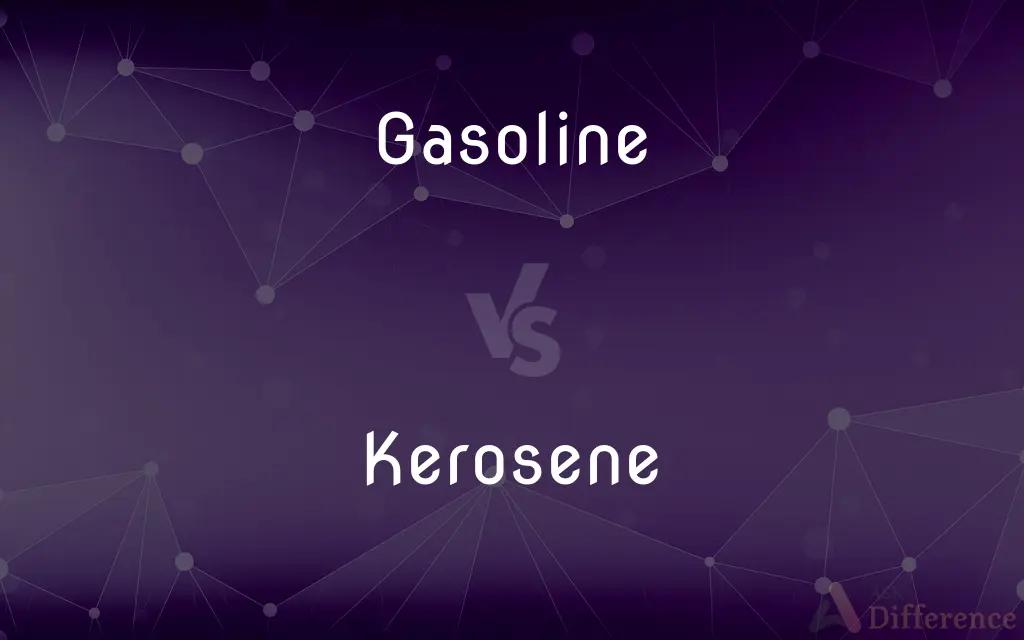Gasoline vs. Kerosene — What's the Difference?
By Tayyaba Rehman — Published on January 31, 2024
Gasoline is a volatile, flammable liquid used primarily as fuel in internal combustion engines, while kerosene is a less volatile fuel used for heating, lamps, and jet engines.

Difference Between Gasoline and Kerosene
Table of Contents
ADVERTISEMENT
Key Differences
Gasoline, a highly volatile liquid, is chiefly used as fuel for vehicles with internal combustion engines. Kerosene, less volatile than gasoline, is commonly used in heating, cooking, and jet engines.
Gasoline is composed of a complex mix of hydrocarbons, obtained from petroleum through refining. Kerosene, also derived from petroleum, is a heavier fuel with a higher boiling point than gasoline.
Due to its volatility, gasoline poses greater risks of fire and requires careful storage. Kerosene, being less volatile, is safer to store and transport but still requires caution due to its flammability.
Gasoline is predominantly used in the automotive industry, while kerosene finds applications in aviation (as jet fuel), domestic heating, and as a solvent in the chemical industry.
Gasoline gained prominence with the rise of automobiles, significantly influencing global economies. Kerosene, once a primary lighting fuel before electricity, now plays a vital role in aviation and other sectors.
ADVERTISEMENT
Comparison Chart
Primary Use
Fuel for vehicles
Heating, lighting, and jet fuel
Volatility
Highly volatile
Less volatile
Boiling Point
Lower boiling point
Higher boiling point
Safety Risks
Higher risk of fire and explosion
Lower risk compared to gasoline
Historical Significance
Became vital with automobile popularity
Was crucial for lighting before electricity
Compare with Definitions
Gasoline
A volatile fuel for internal combustion engines.
She filled her car with gasoline at the station.
Kerosene
A fuel for heating, lighting, and jet engines.
Kerosene lamps were widely used before electric lighting.
Gasoline
Prone to ignition due to high volatility.
Store gasoline in a well-ventilated area to prevent hazards.
Kerosene
Less volatile than gasoline.
Kerosene is safer to store because it's less flammable.
Gasoline
Has a characteristic odor due to hydrocarbons.
The smell of gasoline is strong at the pump.
Kerosene
Obtained from refining crude oil.
Kerosene is produced from the middle distillates of oil refining.
Gasoline
Used globally as a primary automotive fuel.
Global economies often fluctuate with gasoline prices.
Kerosene
Used in both domestic and industrial settings.
They used kerosene for heating their home in the winter.
Gasoline
Derived from petroleum refining.
Gasoline is obtained through the distillation of crude oil.
Kerosene
Has a higher boiling point than gasoline.
Kerosene's higher boiling point makes it suitable for jet fuel.
Gasoline
A volatile mixture of flammable liquid hydrocarbons derived chiefly from crude petroleum and used principally as a fuel for internal-combustion engines.
Kerosene
A thin oil distilled from petroleum or shale oil, used as a fuel for heating and cooking, in lamps, and as a denaturant for alcohol. Also called coal oil.
Gasoline
A flammable liquid consisting of a mixture of refined petroleum hydrocarbons, mainly used as a motor fuel; petrol.
Kerosene
A thin colorless to straw-colored petroleum-based fuel heavier than gasoline/petrol or naptha but lighter than diesel, used primarily as jet fuel but also for heating and lighting in some remote or impoverished areas.
The kerosene lasted all winter, so the furnace kept us always warm.
Gasoline
(countable) Any specific kind of gasoline.
The refinery produces a wide range of gasolines.
Kerosene
An oil used for illuminating purposes, formerly obtained from the distillation of mineral wax, bituminous shale, etc., and hence called also coal oil. It is now produced in immense quantities, chiefly by the distillation and purification of petroleum. It consists chiefly of several hydrocarbons of the methane series, having from 10 to 16 carbon atoms in each molecule, and having a higher boiling point (175 - 325° C) than gasoline or the petroleum ethers, and a lower boling point than the oils.
Gasoline
Marijuana, especially very potent or high quality.
Kerosene
A flammable hydrocarbon oil used as fuel in lamps and heaters
Gasoline
(slang) An alcoholic beverage made of vodka and energy drink.
Gasoline
Made from or using gasoline.
Gasoline
A highly volatile mixture of fluid hydrocarbons, obtained mostly from petroleum, as also by the distillation of bituminous coal. It is used as a fuel for most automobiles and for many other vehicles with internal combustion engines. The gasoline of commerce is typically blended with additives to improve its performance in internal combustion engines. Gasoline was also used in the early 1900's in making air gas, and in giving illuminating power to water gas. See Carburetor.
Gasoline
A volatile flammable mixture of hydrocarbons (hexane and heptane and octane etc.) derived from petroleum; used mainly as a fuel in internal-combustion engines
Common Curiosities
How are gasoline and kerosene obtained?
Both are derived from the refining of crude oil.
What is gasoline?
A volatile liquid fuel used primarily in vehicles.
Is gasoline safe to store at home?
It poses fire risks and should be stored cautiously.
What are the primary uses of kerosene?
Heating, lighting, and as jet fuel.
Can kerosene be used in cars?
No, it's not suitable for use in standard internal combustion engines.
What is kerosene?
A less volatile fuel used for heating, lighting, and in jet engines.
Which is more volatile, gasoline or kerosene?
Gasoline is more volatile than kerosene.
Was kerosene ever used for lighting?
Yes, before electricity, it was a common lighting fuel.
What's the boiling point of gasoline?
It has a lower boiling point compared to kerosene.
How has gasoline influenced global economies?
It's crucial to the automotive industry, affecting global oil demand.
Can kerosene and gasoline be mixed?
Mixing them is not advisable due to different properties and uses.
How does the cost of gasoline compare to kerosene?
The cost varies based on market and geographical factors.
Can kerosene be used in all types of jet engines?
It's commonly used in aviation but not suitable for all jet engines.
What's the impact of gasoline on the environment?
Gasoline combustion contributes to air pollution and greenhouse gases.
Is kerosene used in any household appliances?
Yes, in heaters and lamps.
Share Your Discovery

Previous Comparison
LAN vs. MAN
Next Comparison
O Acylation vs. N AcylationAuthor Spotlight
Written by
Tayyaba RehmanTayyaba Rehman is a distinguished writer, currently serving as a primary contributor to askdifference.com. As a researcher in semantics and etymology, Tayyaba's passion for the complexity of languages and their distinctions has found a perfect home on the platform. Tayyaba delves into the intricacies of language, distinguishing between commonly confused words and phrases, thereby providing clarity for readers worldwide.













































